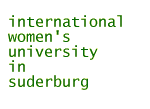- Biodiversity
- Development
- Natural selection
- Evolution
- Utilitarism
|
|
Welcome everybody, my name is Winnie Chang,
I'm here today to share my feelings with you. |
It's strange to talk about feelings, but I always have the feeling – always - that I am like a fish
living in a fish-bowl in a closed system, a closed space on this earth: there's no way out, there is no way to escape,
and you - everyone – you are here with me in this bowl too.
Some of you maybe don't feel the same way as I do –
living in a container – it doesn't surprise me –
how can a fish see the glass, the boundaries of the living space.
A fish would never understand how much it depends on the grass –
the fish-grass - the interdependency between the fish and the grass,
the grass and the water, the water and the fish and maybe
all the other species: insects, bacteria even.
We rely on other species so much, we don't realize it.
I would like to ask you, what a bee can do for you:
Apart from making honey, apart from making your garden beautiful,
what can a bee do for you?
A couple of months ago in a little country New Zealand, in the southern hemisphere, the bees got sick and the whole country was
panicking.
Because of the sickness of the bees?
Why?
Because the country's economic foundation was shaking.
The bees pollenate flowers: the flowers of vegetables,
the flowers of fruits, kiwi fruits, the flowers of crops,
the wheat and the rice.
And also the bees help the grass to grow for feeding cattles and sheep;
in other words: the milk, the meat, the clothing materials,
the fashion industry for both domestic and overseas markets.
Some people asked me: why are we talking about biodiversity?
Apart from feeling guilty when we know we are never going to see this kind of bird forever forever again, apart from feeling a little bit sorry,
why bother to keep this kind of bird alive, this kind of bird that doesn't even know how to fly?
I'm sorry but this is natural selection! Too bad, my little bird, you are just too weak to survive in this cruel cruel world where the
evolution rules.
Some scientists will say, hold on a second, we might find this bird very useful later, we might find a very useful treatment for cancer.
Still utilitarism, isn't it?
I don't think it's right.
For me biodiversity is a matter of balance.
It keeps the balance within a closed ecosystem.
We have to admit our knowledge has a limit.
Sometimes you don't know, when we lose a particular species, when we lose a particular kind of flower, what kind of impact that could
make, it may be huge - and we don't know it, which doesn't necessarily mean
it doesn't make any difference.
How does the current world work?
It works like this, (draws a spiral) the experts call it development:
it keeps going, it keeps going, it keeps going and going and going (spiral grows larger)
What if just half of the world population all wanted a house of their own, with a front garden and a backyard they can water twice a day
or just half of the population of the world – billions of them - want a car which they can drive freely, which is a freedom, which is a free
choice, as long, as far, as much as they want to?
what do you feel?
I smell a danger.
I smell the danger that people believe in development, believe in progress like a religion.
I feel suffocated by this pressure. I'm pushed to the edge of my little tiny living space.
Maybe apart from belief in science we should believe in something else -
the kind of belief that was shared by many early human civilisations:
coexistence with other living beings, all together in harmony
that is my feeling.

